EzQuant Quantification Assay Kits
EzQuant Quantification Assays are your trusted choice for dsDNA HS, ssDNA, and RNA HS detection. These assays utilize a highly specific fluorescent dye that binds precisely to the target molecule. This allows accurate quantification down to 10 pg/µl, even in the presence of contaminants or degraded DNA/RNA. EzQuant Quantification Assays only require a 1 µl sample and a quick 2-minute incubation. This significantly enhances the efficiency of your quantification processes.

Features and Benefits
Features
-
Samples can be as little as 1 µl.
-
Only 2 minutes of incubation is needed.
-
Results can be read in seconds.
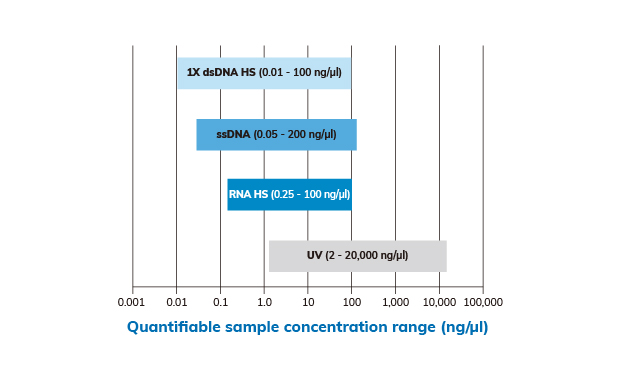
Figure 1. The initial sample concentration for EzQuant Quantification Assays and UV absorbance measurements ranges from 1 - 20 µl. UV absorbance measurement can quantify high concentration samples, but are not selective for DNA or RNA.
EzQuant 1X dsDNA HS Quantification Kit
EzQuant 1X dsDNA HS Quantification Kit contains a highly specific fluorescent dye designed for samples with low dsDNA concentration and which also has good tolerance to contaminants. Ready-to-use working solutions and standards are provided. Easy and accurate DNA sample quantification, within a range of 10 pg/μl to 100 ng/μl, can be performed with EzCube Fluorometer for samples with volumes from 1 – 20 µl.
Sensitivity
EzQuant 1X dsDNA HS Quantification Assay has higher sensitivity to dsDNA than RNA.
.jpg)
Figure 2. The DNA sensitivity of EzQuant 1X dsDNA HS Quantification Assay was determined from an assay of 10 µl samples containing different concentrations of DNA, RNA, and a mixture of DNA and RNA.
Linearity
EzQuant 1X dsDNA HS Quantification Assay exhibits good linearity, identical to that from Qubit™ 1X dsDNA HS Assay.
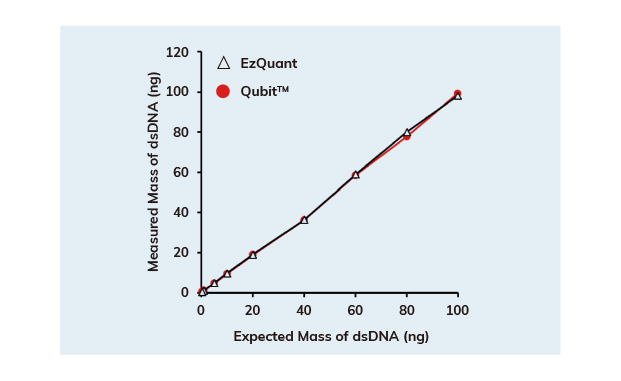
Figure 3. Linearity between measured and prepared dsDNA concentrations for EzQuant and Qubit™ assays. Samples (10 µl) of two standard solutions, S1 (0 ng/µl) and S2 (10 ng/µl) were used to establish a standard curve, and dilutions of S2 were used for quantification.
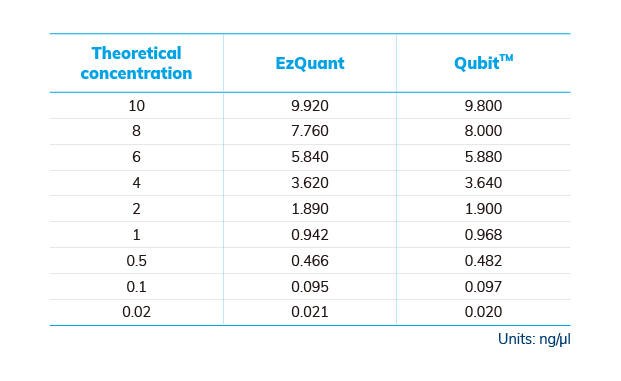
Table 1. Different concentrations of DNA were diluted from standard S2 (10 ng/µl) and quantified using EzQuant and Qubit™ assays.
Comparison of EzQuant and Qubit™ 1X dsDNA HS Assay
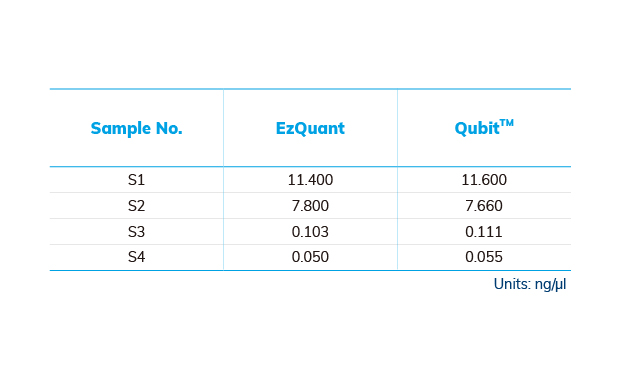
Table 2. Data comparison of EzQuant and Qubit™ assays on four different DNA
samples.
Inter-batch Stability of EzQuant 1X dsDNA HS Quantification Kit
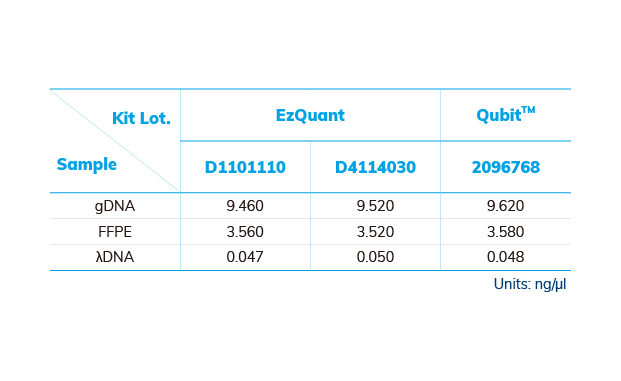
Table 3. Inter-batch stability performance test of EzQuant 1X dsDNA HS Quantification Kit. Three different DNA samples were assayed in two lots with EzQuant and compared with results from Qubit™ 1X dsDNA HS Assay Kit.
EzQuant RNA HS Quantification Kit
EzQuant RNA HS Quantification Kit contains a highly specific fluorescent dye designed for samples with low concentrations of RNA and has good tolerance to contaminants. This kit, used with EzCube fluorometer, enables the quick and accurate assay of low-concentration RNA samples ranging from 0.25 to 100 ng/µl.
Sensitivity
EzQuant RNA HS Quantification Assay shows higher sensitivity to RNA than DNA.
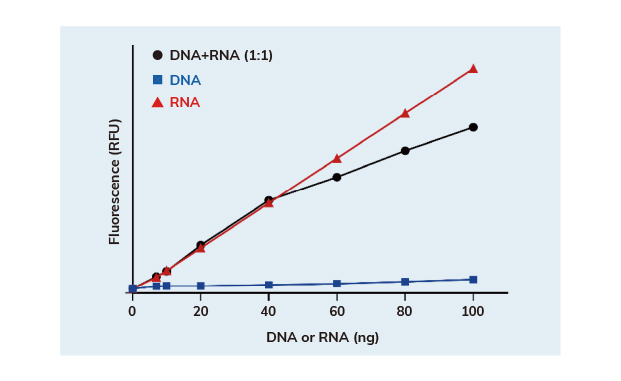
Figure 4. The RNA sensitivity of EzQuant RNA HS Quantification Assay was determined in 10 µl samples with different concentrations of DNA, RNA, and a mixture of DNA and RNA using EzQuant RNA HS Quantification Assay and EzCube fluorometer.
Linearity
EzQuant RNA HS Quantification Assay exhibits good linearity, identical to that obtained with Qubit™ RNA HS Assay.
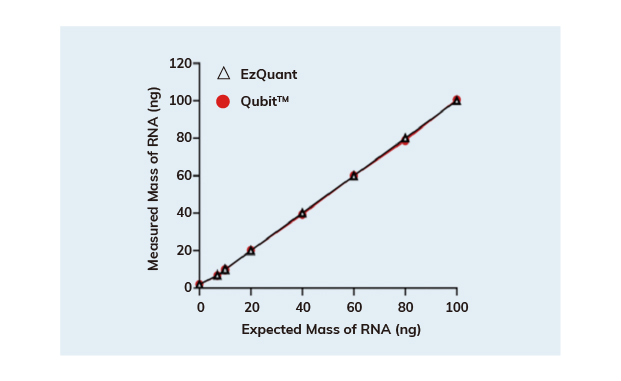
Figure 5. Linearity between measured and prepared RNA concentrations for EzQuant and Qubit™ assays. Samples (10 µl) of two standard solutions, S1 (0 ng/µl) and S2 (10 ng/µl) were used to establish a standard curve, and dilutions of S2 were used for quantification.
EzQuant ssDNA Quantification Kit
EzQuant ssDNA Quantification Kit is used for ssDNA or oligonucleotides. It enables quick and accurate quantification of low-concentration samples from 50 pg/µl to 200 ng/µl when used with EzCube fluorometer. It does not specifically recognize ssDNA, but can bind to dsDNA and RNA. However, assay results are not affected by common contaminants; such as proteins, salts, or detergents.
Linearity
EzQuant ssDNA Quantification Assay exhibits good linearity, identical to that from Qubit™ ssDNA Assay.
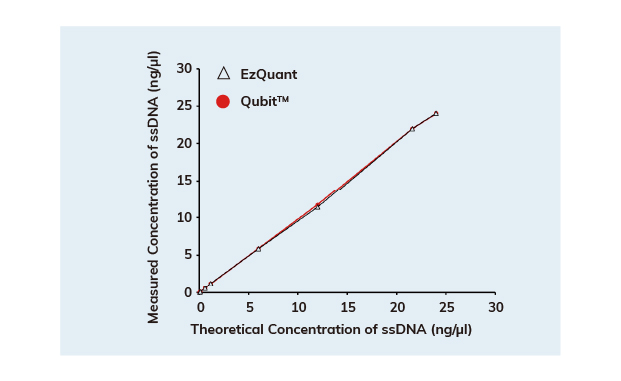
Figure 6. Linearity between measured and prepared ssDNA concentrations for EzQuant and Qubit™ assays. ssDNA standards of known concentration were diluted to different concentrations and analyzed using EzQuant and Qubit™ assays.
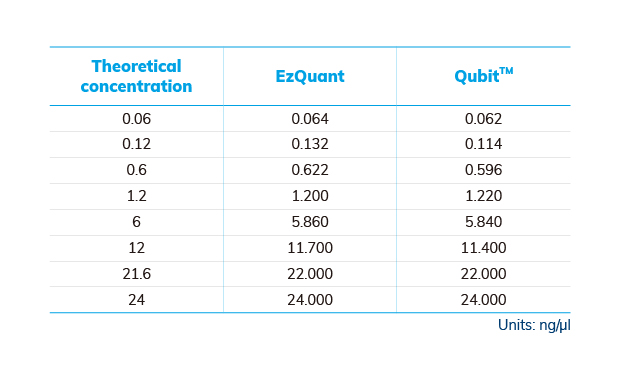
Table 4. Data comparison of EzQuant and Qubit™ assays on 8 different ssDNA samples diluted from a known ssDNA standard solution.
Note:
Qubit™ is a registered trademark of Thermo Fisher Scientific and its subsidiaries. It is used here for identification and reference purposes only.
The data presented in this document is obtained under specific laboratory conditions and is for reference only. Users are solely responsible for evaluating the data and determining its suitability for their intended use. Users assume all risks associated with the use of the data in this document.
Ordering
- BRFP-0300
- EzCube Fluorometer (Blue, Red & Green)
- BRQK011-010000
(T00-FPBR00-00) - EzQuant 1X dsDNA HS Quantification Kit (100 Assays)
- BRQK011-050000
(T00-FPBR04-00) - EzQuant 1X dsDNA HS Quantification Kit (500 Assays)
- BRQK020-010000
(T00-FPBR01-00) - EzQuant ssDNA Quantification Kit (100 Assays)
- BRQK031-010000
(T00-FPBR02-00) - EzQuant RNA HS Quantification Kit (100 Assays)
- BRQK100-050000
(T00-FPBR03-00) - 0.5 ml Thin Wall PCR Tube
